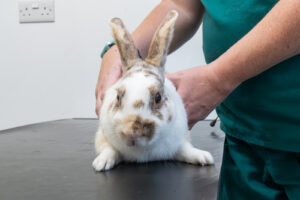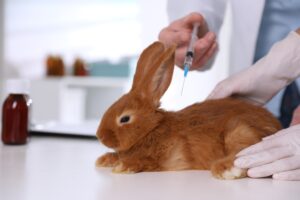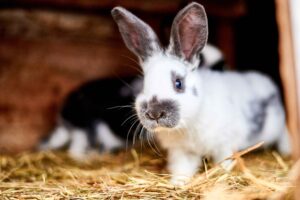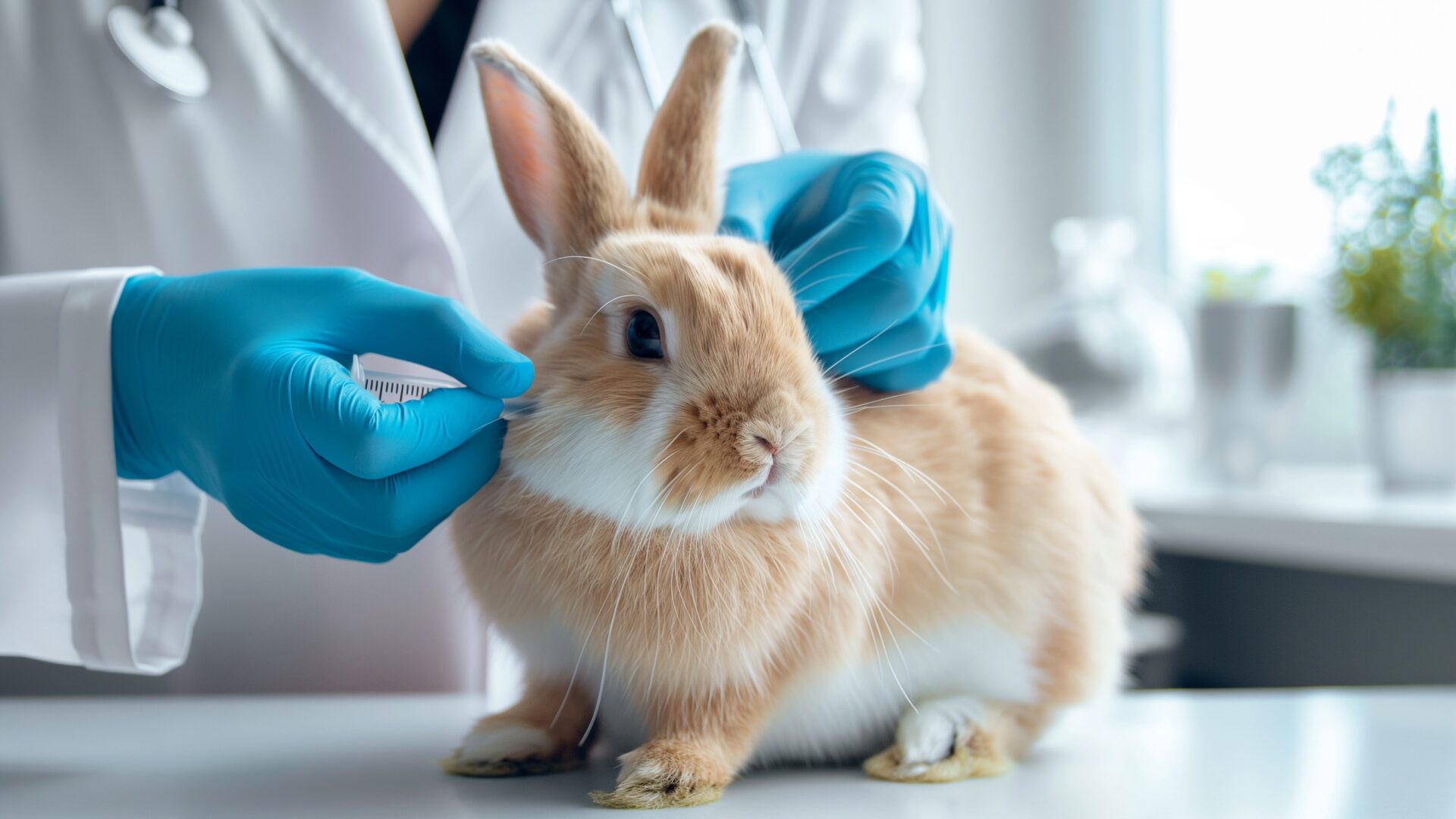Updated: 24/04/25
It’s important that rabbits are vaccinated to protect them against potentially life-threatening diseases.
Rabbits should be vaccinated against Myxomatosis and Rabbit Viral Haemorrhagic Disease. They can start vaccines against these combined risks from 5 weeks old. Slightly earlier vaccination is available against Rabbit Viral Haemorrhagic Disease and may be recommended in high-risk situations
Myxomatosis can be spread by biting insects, including mosquitoes, midges and fleas. Fleas aren’t very common in pet rabbits, but can be picked up from other animals. Safe flea control products can be purchased from your veterinary practice if required.
Rabbits need regular booster injections each year, and vaccine appointments provide the chance for your vet to also weigh your rabbit, give them a full health check and discuss any concerns you may have.
Please contact your vet to find out more or book a vaccination appointment.
On this page:
- Why do we vaccinate rabbits?
- Rabbit viral haemorrhagic disease
- Does my indoor rabbit need vaccinating?
- How often does my rabbit need to be vaccinated?
- What happens at a vaccination appointment?
- Will my rabbit feel poorly after their vaccinations?
- Vaccine record cards
- My rabbit is unvaccinated or has missed booster vaccinations
Why do we vaccinate rabbits?
Vaccination creates immunity (the natural ability to fight infection) by exposing the body to a small but entirely harmless dose of the diseases we want to protect against.
Rabbit Kits may be protected in the first few weeks of life if their mother has immunity, which can be passed to them through their mother’s milk. However, this fades rapidly. Rabbits can be vaccinated from five weeks old to ensure they are kept safe and protected against dangerous diseases.
Rabbits can be vaccinated from five weeks old to ensure they are kept safe and protected against dangerous diseases. After vaccination, it takes three weeks to reach full immunity, which lasts for a year.

Like every responsible pet owner, you want your rabbit to live a happy, healthy life.
Vaccinations and health checks are an essential part of this care. Routine vaccinations protect against contagious and potentially life-threatening diseases.
Your rabbit should be routinely vaccinated against Myxomatosis and Viral Haemorrhagic Disease (RVHD) strains one and two. A triple vaccination for these diseases is available.
Myxomatosis
This disease is readily spread from wild rabbits to pet rabbits via fleas and biting insects.
In addition to vaccination, it is also important to minimise your rabbits’ risk of exposure to biting insects and fleas, by using fly screens or nets where appropriate, and ensuring other pets such as cats are treated for fleas to minimise spread. For high risk rabbits, your vet can discuss rabbit safe preventative products.
Symptoms of myxomatosis include runny eyes and nose, low energy, reduced or absent appetite, swelling around the eyes/face/ears and genitals, a fever, breathing issues and bumpy/scabby skin on the body and face.
Rabbit viral haemorrhagic disease (RVHD, strains one and two)
This disease rapidly spreads between rabbits and can be passed from outdoor clothing and footwear, so caution is needed to avoid accidentally introducing this disease, and vaccination is essential.
Symptoms of RVHD include a high fever, low energy, reduced or absent appetite, bleeding from the nose, mouth or bottom and sudden, unexplained death.
Do indoor rabbits need to be vaccinated?
Myxomatosis and rabbit haemorrhagic disease are easily transmissible. Both indoor and outdoor rabbits are at risk and should be vaccinated.
How often does my rabbit need to be vaccinated?
Vaccination against Myxomatosis and both strains of Rabbit Viral Haemorrhagic Disease (RVHD) is needed annually.
These diseases are usually life-threatening to an unvaccinated rabbit, and no cures exist.

What happens at a vaccination appointment?
When your rabbit attends a vaccination appointment, the vet will give them a full health check and record their weight.
They will discuss any concerns with you and, providing your rabbit is well, they will receive a small injection, which is often given under the skin on the back of the neck.
Your vet will then fill in your rabbit’s vaccination card and advise you on when the next injection is required to achieve continued protection.
Veterinary Nurse Carli Shaw (BSc Dip RVN) says:
Deadly diseases can pass very easily between rabbits – not simply from direct contact but via insects too. The effects of diseases like Myxomatosis and Rabbit Viral Haemorrhagic Disease (RVHD) can be devastating in nature, so simple annual vaccinations are an extremely important way of helping prevent them.
Will my rabbit feel poorly after their vaccinations?
For most rabbits they show no symptoms of feeling poorly after their vaccinations.
Mild signs, such as being a little quiet or having a mild increase in body temperature can be seen, but usually rabbits will be back to their normal self within 24 hours or so.
On occasion, a small swelling can be felt at the scruff of the neck where the vaccine was given and will usually go down. Always contact your vet if you are concerned.
Serious vaccine reactions are very rare, and the risks are far outweighed by the protection vaccines offer.
It’s important that vaccine reactions are reported by vets or owners to the Veterinary Medicines Directorate (VMD). This allows for constant safety monitoring of the vaccine.
If your rabbit ever seems poorly after a vaccine, is off their food or you are worried about them, please reach out to your vet for further advice and support.

Vaccine record cards
When your rabbit is vaccinated your vet will provide you with a vaccination record card. Please keep this safe as you will need it as an ongoing record.
My rabbit is unvaccinated or has missed their booster vaccination – what now?
If you are concerned that your rabbit is not vaccinated or has gone over a year between booster vaccinations, then speak to your vet.
If there is no evidence to suggest they are up to date with vaccines, it is often sensible and safest to revaccinate them – this is a single injection. This will not cause any harm and will ensure your rabbit is fully protected going forwards.
If you have any questions about vaccination, reach out to your vet for further advice.
With many thanks to Deborah Stafford MA VetMB MRCVS GPCertExAP for contributing to this content.
Found this article useful? You may like:

